Uproar
Uproar
Calm Leadership in Anxious Times
Peter L. Steinke
Rowman & Littlefield
Lanham Boulder New York London
Published by Rowman & Littlefield
An imprint of The Rowman & Littlefield Publishing Group, Inc.
4501 Forbes Boulevard, Suite 200, Lanham, Maryland 20706
www.rowman.com
6 Tinworth Street, London SE11 5AL, United Kingdom
Distributed by NATIONAL BOOK NETWORK
Copyright 2019 by The Rowman & Littlefield Publishing Group, Inc.
All rights reserved . No part of this book may be reproduced in any form or by any electronic or mechanical means, including information storage and retrieval systems, without written permission from the publisher, except by a reviewer who may quote passages in a review.
British Library Cataloguing in Publication Information Available
Library of Congress Cataloging-in-Publication Data
Names: Steinke, Peter L., author.
Title: Uproar : calm leadership in anxious times / Peter L. Steinke.
Description: Lanham : Rowman & Littlefield, [2019] | Includes bibliographical references and index.
Identifiers: LCCN 2018039885 (print) | LCCN 2018051490 (ebook) | ISBN 9781538116548 (ebook) | ISBN 9781538116531 (pbk. : alk. paper)
Subjects: LCSH: LeadershipPsychological aspects.
Classification: LCC BF637.L4 (ebook) | LCC BF637.L4 S8256 2019 (print) | DDC 158/.4dc23
LC record available at https://lccn.loc.gov/2018039885
 The paper used in this publication meets the minimum requirements of American National Standard for Information SciencesPermanence of Paper for Printed Library Materials, ANSI/NISO Z39.48-1992.
The paper used in this publication meets the minimum requirements of American National Standard for Information SciencesPermanence of Paper for Printed Library Materials, ANSI/NISO Z39.48-1992.
Printed in the United States of America
Introduction
F or more than twenty-five years, I have worked with small and large systems from a variety of professional viewpoints: first as the minister of several churches, next as the director of a program for emotionally troubled youth, the director of two counseling centers supported by a social service agency and a hospital, an adjunct professor, and finally a consultant to organizations.
I was fortunate to discover the Post Graduate Seminar in Family Emotional Process in Bethesda, Maryland, under the tutelage of Dr. Edwin Friedman, author of A Failure of Nerve: Leadership in the Age of the Quick Fix. He introduced me to the Bowen family system theory. The system perspective gave me the vantage point from which to view emotional process, whether I was observing a family, a congregation, a hospital, an educational unit, a small business, or a large company. I learned that six major triggers incited anxiety in these systems, and no one trigger affected the emotional system more than the leadership, whether the leaders were parents, priests, principals, presidents, board chairpersons, owners, or chief operating officers. How any one of them handled self in the emotional system was more determinate than anything else in terms of outcome. Critical to all situations was the degree of responsibility expressed in the system.
You will observe how leaders impact a system by
- separating themselves from the surrounding anxiety
- making decisions based on principle, not instinct
- taking responsibility for their own emotional being
- regulating their own anxiety in the face of sabotage or resistance
- staying connected to others, even those who disagree with them
- choosing self-directed goals
- being a non-anxious presence
- supplying an immune response to pathogenic forces (invasiveness)
- focusing on emotional processes rather than the symptoms they produce
- not allowing the most dependent to be in control
- knowing that people naturally influence one another
- recognizing leader and follower as complements, parts of the whole
- realizing that insight, love, and reasonableness are not adequate for change in an anxious system
- accepting that mature leadership does not always work, that immaturity is too embedded in the system
The overall health and functioning of any organization depends primarily on one or several people at the top who can exercise the above characteristics well.
Despite the rash of books written on leadership in the last two or three decades, we have not seen an increment in effective leadership throughout the institutional world. Religious leaders were slow to acknowledge sexual predation among priests; political leaders continued to serve their donors needs and their own reelection. Business figures were indicted for deceptive practices. Colleges and universities protected faculty and students who preyed on others. Researchers fudged their results or hid them from public view. Locally, citizens heard reports of malfeasance by those in positions of authority. Long repressed (for diverse reasons), many individuals exposed those in leadership positions who had sexually harassed or abused them.
It is known that the key characteristic of a pathogenic force is invasiveness: violating the space, dignity, and emotional well-being of others. Viruses, demagogues, parasites, bullies, sexual predators, and name-calling blamers function in the same way. They have no boundaries, they do not respect the boundaries of others (and obviously go where they dont belong), they must have it their own way, and they never learn from their experience. Being in a role of leader, one may be tempted more than others to be a transgressor or trespasser if one thinks of self as entitled or special.
Perhaps more important, the leadership literature has addressed leadership from a faulty base: leaders have certain personality traits, exercise an authoritarian presence, enjoy the competitive world, possess more knowledge and data, have fingertip answers, demonstrate boldness, and are strangers to self-doubt. Absent from the discussion of leadership is the capacity to work through emotional processes. If emotion is mentioned, its a retardant to thinking, or if placed in a positive light, emotion becomes part of a technique to motivate people to do something. One will scarcely read about the interplay between emotion and cognition in decision making. Processing information (how we hear, what questions we ask, etc.), we think, travels one way on Thought Street. Yet, what we do, think, and feel is tinged with the emotional, the hidden agenda.
No doubt, we can attribute some of this to the fact that most books on leadership are written by men who would rather live as if they are in control, not prone to flashes of instinct or purveyors of mindless action.
From a fresh perspective, Murray Bowen asserts that the emotional system is elemental to the whole human enterprise, and he addresses what leaders can do to impact the system with clarity, conviction, differentiation, presence, and calm functioning. Further, his student Dr. Edwin Friedman noted how leaders today suffer a failure of nerve by giving quick fixes, which simply gives leveraging power to the most immature, dependent, and recalcitrant individuals. By pleasing their lizard brain, the leader, unaware, is operating from the same lesser neurological base. Friedman notes that the quick fix eliminates the opportunity to challenge people to grow and be responsible and responsive people. Instant solutions favor the neediness of people. Even more, when leaders manipulate, lie, or play on peoples anger and frustration for self-gain, the lizard brain has its glorious moment.
Our word for leader is derived from the Old English word laeden , which has antecedents with the Dutch leiden and the German leiten . It means to go, depart, travel, and guide. Leadership that caters to emotional needs (reduction of pain, fast relief, certainty) is in league with survival, not challenge. Leading implies movement. There has to be a shift in the emotional processes of the system, or imaginative gridlock ensues. Being curious, imagining, and reframing is as much emotional as cognitive.
Next page
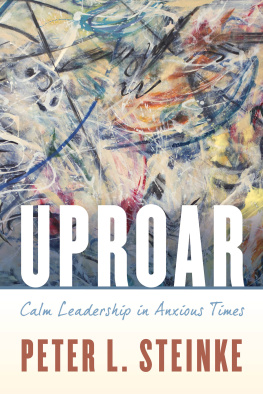
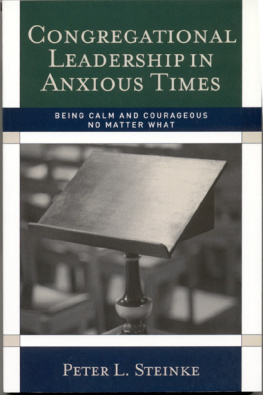


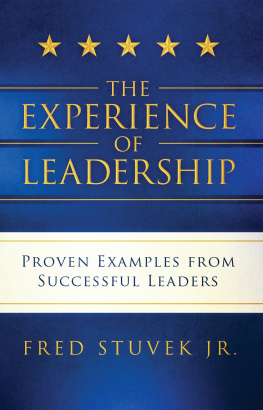

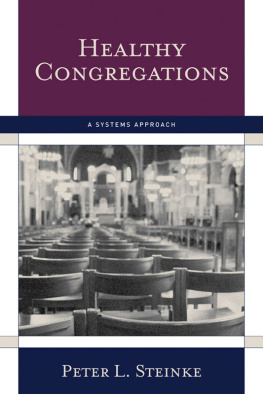
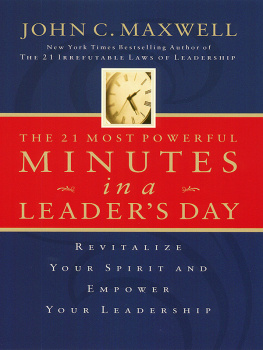
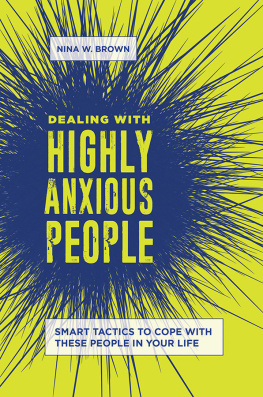
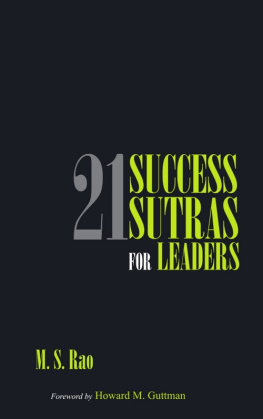
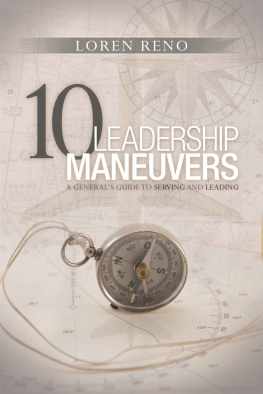
 The paper used in this publication meets the minimum requirements of American National Standard for Information SciencesPermanence of Paper for Printed Library Materials, ANSI/NISO Z39.48-1992.
The paper used in this publication meets the minimum requirements of American National Standard for Information SciencesPermanence of Paper for Printed Library Materials, ANSI/NISO Z39.48-1992.